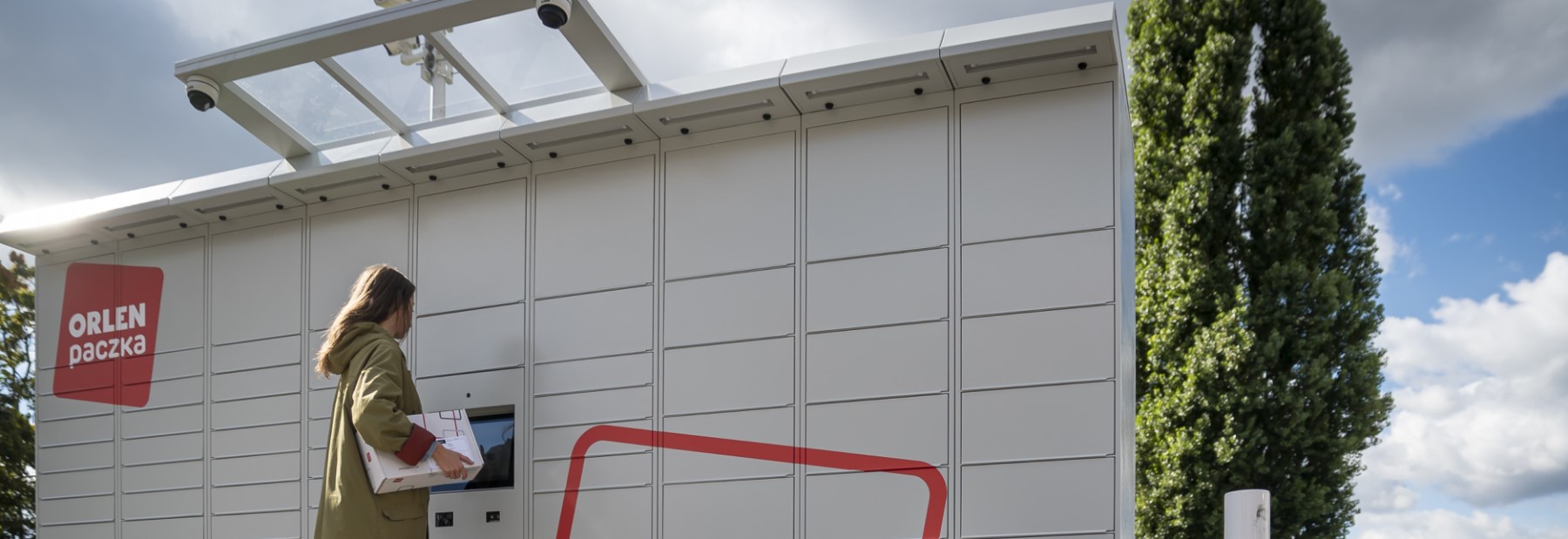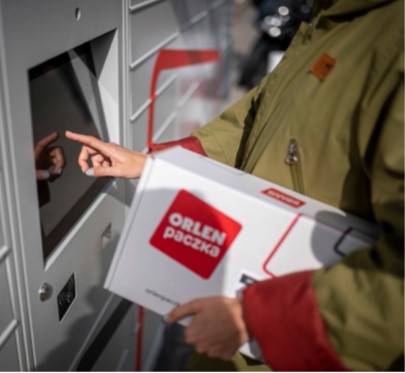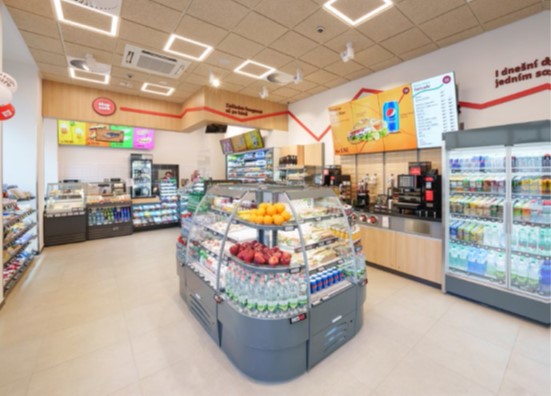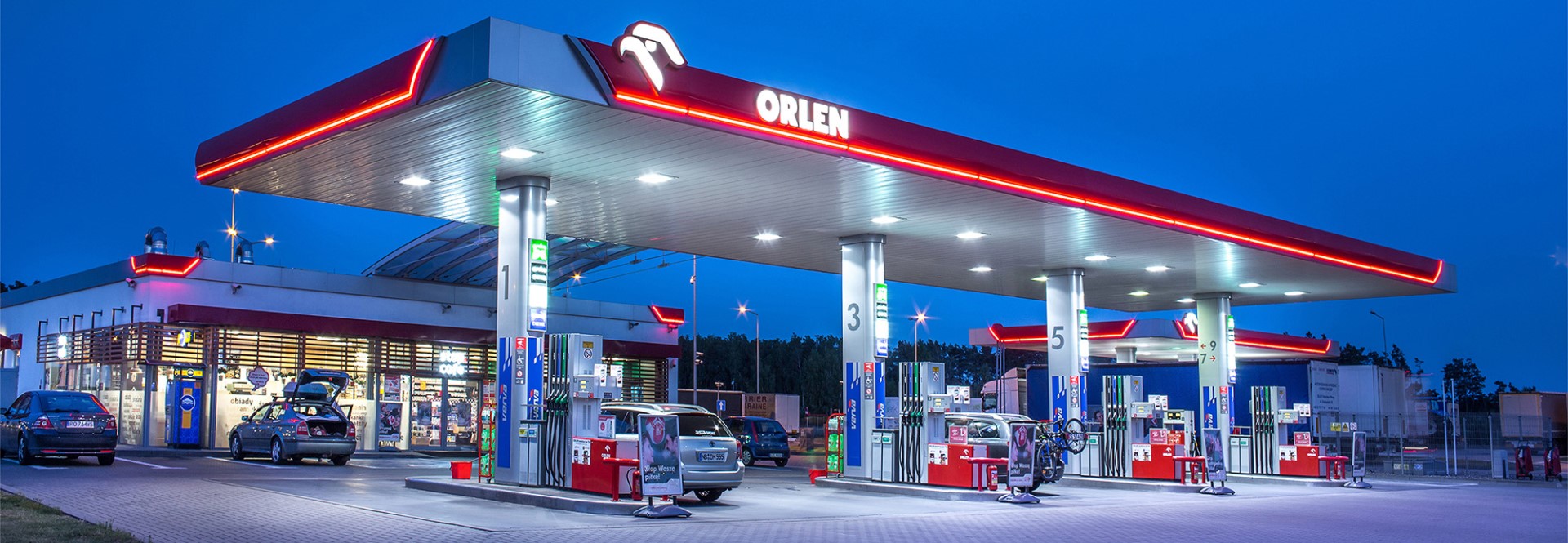Growth of the Company’s retail segment is driven by enlargement of the sales network and significant expansion of the product portfolio offered to customers.
Clients
One of the principal aspects of the ORLEN Group's operations is a steady improvement in the quality of its products, services and customer service standards. Customers are a key stakeholder for the ORLEN Group.

-
103-1
-
103-2
-
103-3
Over 3,500 ORLEN-branded service stations are to operate in Central and Eastern Europe by 2030. The Group will seek to enhance the availability of alternative fuels, for instance by deploying at least 1,000 EV fast chargers and developing the sales of hydrogen and LNG/CNG.
The ORLEN Group manages Central and Eastern Europe’s largest chain of over 2,800 service stations, located in Poland, the Czech Republic, Germany, Slovakia and Lithuania. As at the end of 2021, the chain comprised more than 2,000 Stop Cafe/star Connect/ORLEN w ruchu non-fuel outlets. The ORLEN Group consistently adapted its service station chain to sell alternative fuels. As at the end of 2021, customers had access to 454 EV charging stations, located mainly in Poland, 2 hydrogen refuelling stations, and 44 CNG stations. 400 automated parcel machines were placed in service as part of the ORLEN Paczka (ORLEN Parcel) service, and a new retail format ORLEN w ruchu (ORLEN in Motion) – retail stores outside the service station chain – was launched. In addition, the Group completed the acquisition of 100% of the shares in OTP, Poland’s largest road carrier of liquid fuels.

Our broad integrated offering of non-fuel products and services is expected to keep attracting new customer groups. The ORLEN 2030 Strategy, published in November 2020, provides for growing retail sales, including through the development of modern communication channels and digitalisation of sales formats based on the RUCH network. RUCH is not only a network of newsstands in very good locations, but also advanced courier services. The launch of RUCH’s potential, development of new store and food service formats outside ORLEN service stations, as well as the network of parcel pick-up points will accelerate growth of our retail segment. Through RUCH, PKN ORLEN acquired 4,500 parcel collection points. PKN ORLEN is also rolling out its ORLEN Pay and mFLOTA ORLEN services, enabling payments at the pump. Their latest versions allow customers to purchase e-tickets for toll sections of state motorways (A2 Konin Wschód – -Stryków and A4 Bielany Wrocławskie – Gliwice Sośnica) for vehicles with a maximum permissible weight below 3.5 tonnes.

For more than four years, the Stop Cafe food service offering has included a permanent vegan and vegetarian food range, which is constantly expanded. Launched in 2021, the new stop.cafe line of soup and lunch products made from fresh, high-quality ingredients containing no preservatives, is increasingly popular with customers.
For over twelve years now, Fairtrade-certified coffee has been available at all Stop Cafe outlets within the ORLEN retail chain. By participating in the Fairtrade programme we support the development of farming communities in the global South countries.
As a socially responsible company, friendly to families with children, PKN ORLEN has joined the Large Family Card programme. Holders of the card are offered discounts at ORLEN service stations across Poland when purchasing fuel, Stop Cafe products or using car wash services.
Facilities for people with disabilities at PKN ORLEN stations: Almost 1,480 service stations have toilets adapted to the needs of people with disabilities, and at 1,204 stations there are special parking spaces for the disabled. Ramps for people with disabilities are available at 1,504 stations. We are gradually expanding present-day solutions to enhance the accessibility of our services. At all ORLEN service stations, customers can pay for fuel at the pump via the ORLEN Pay mobile application, using a special QR code displayed on each pump . In 2021, to achieve further service improvements, the Mobile Cashier and the Fast Lane programmes were extended. The PKN ORLEN chain has three ORLEN Drive stations where motorists, including those with disabilities, can use a complete range of refuelling and food services without leaving their car. In recent years, over 30 thousand employees of the ORLEN service stations have received training in services to people with disabilities. The training system was developed in cooperation with the INTEGRATION Foundation.
1,480 stations
have toilets adapted to the needs of people with disabilities
Health and safety
Our service stations are a safe place for both customers and employees
All sites are equipped with burglary and robbery alarm systems. Contracts with professional security providers guarantee quick arrival of a patrol if needed. All of our service stations have CCTV systems that record events inside and outside the facilities. The stations also have their own rules for vehicle and human traffic on their premises which, combined with luminescent markings, increase the overall safety level.
The stations with LPG pumps are adapted to enable safe refuelling of gas-powered vehicles. Service station attendants are always ready to assist customers and help them refuel their cars.
All PKN ORLEN service stations apply the HACCP Food Safety Management System. It is based on the Codex Alimentarius requirements applied by the ORLEN Group since 2005. The HACCP system is steadily improved and developed along with our dynamically growing food and beverage services. Its purpose is to guarantee that food products sold at the stations satisfy all the sanitary requirements, are safe, and their quality meets the relevant standards, Both in the case of individually packaged products and all products prepared in accordance with the food offering of the Stop Cafe, Stop Cafe Bistro, and Stop Cafe 2.0 outlets and in the restaurants.
HACCP has a significant impact on the quality and safety of the products we sell. Standardised food handling procedures include the requirements for delivery, receipt, storage and warehousing, as well as the rules and conditions for preparation for sale and consumption of food products offered by ORLEN. The system safeguards used in HACCP ensure that food-related processes are registered and monitored. ORLEN’s regulations in this area include hygiene and production best practices, including the principles of traceability, supervision of allergens or handling of incidents that may affect food safety.
Service stations have access to the electronic version of the HACCP System Documentation through the Ekosystem website for CODO service stations and the DOFO Service Stations Portal. HACCP, standing for Hazard Analysis and Critical Control Points, is a system used to identify health threats and the risk of their occurrence at various stages of food production and distribution. It helps control and mitigate all hazards to consumer safety and health. As basically HACCP is a preventive system, its safeguards aim to minimise hazards related to food sale, protecting consumers by guaranteeing safety and high quality of purchased foodstuffs. It also protects food manufacturers, who are able to prove that their products are safe if their production processes are run correctly and are properly documented. The whole system features internal verification components and is audited on a regular basis.
-
416-2
In 2021, there were no incidents of non-compliance with regulations and voluntary codes concerning the health and safety impacts of products and services during their life cycle, by type of outcomes.

The station personnel are instructed to strictly obey the ban on selling alcoholic beverages and tobacco products to minors. Appropriate notices are put up at every site, and awareness training is organised for the staff. Another practice is to make service station personnel sign declarations in which they undertake to observe the Upbringing in Sobriety and Alcoholism Prevention Act, verify the age of potential customers, and refuse a sale if they suspect it could be in breach of the Act.
PKN ORLEN has consistently taken action to prevent the spread of the coronavirus pandemic. The hand sanitizer produced by the ORLEN Group’s Jedlicze plant and protective masks, mainly from domestic producers, have been available for sale at all ORLEN service stations. During the dynamic spread of the coronavirus epidemic, rescue service workers were served out of turn at the service stations. In connection with the epidemic, emergency procedures have been implemented at the stations to ensure safety of the customers and employees:
- the stations have been equipped with air-purifying sterilizers;
- routine sanitising of customer contact surfaces has been implemented;
- hand sanitiser and disposable gloves have been provided;
- additional HACCP guidelines have been introduced (individually wrapped coffee accessories and food products).
Customer service standards
-
102-43
The ORLEN Group regularly monitors customer satisfaction and loyalty. As the service stations are constantly developed, the range of products and services available to customers is diverse and dynamic, with new products and special offers regularly introduced in the catering, fuel and store product portfolios. The quality of service is regularly verified based on internal assessments carried out by micromarket managers by means of surveys completed on mobile devices, and using a ‘mystery shopper’ at all CODO and DOFO stations. Customer satisfaction is measured on an ongoing basis based on the service satisfaction index and Net Promoter Score (NPS) for VITAY customers. The customer satisfaction metrics have invariably been at high levels.
It is also vital to monitor customer satisfaction with various aspects of service station activities. One of the elements enhancing customer relations is the Company’s approach to customers’ feedback and complaints. The customers have several options to contact us and express their opinion about a service station or the services: over the Internet, by phone, or personally at service stations. In each case, the contact is registered in the complaints management system, which also records positive opinions and thanks from customers.
Care for the natural environment
The ORLEN Group is particularly committed to environmental protection and this commitment also extends to its service stations.
With environmental protection in mind, PKN ORLEN is working to optimise the quality of packaging and accessories and replace them with biodegradable substitutes (subject to biochemical decomposition), e.g. plastic straws have been replaced with paper ones; multi-material food packaging has been replaced with single-material packaging (mainly paper-based); plastic cutlery is being withdrawn and replaced with wooden cutlery; disposable plastic packaging (e.g. for lettuce or hot meals) is being replaced with packaging made of sugar cane (bagasse) pulp. Most of our paper and cardboard packaging is FSC certified (the Forest Stewardship Council® certification system makes it possible to distinguish wood products sourced from sustainably managed areas) or PEFC certified (the Chain of Custody of Forest-based Products certification facilitates identification of the origin of the wood materials from which packaging is made at every stage of its processing and flow).
This is particularly important in the case of oils, operating fluids and automotive chemicals.
All packaging is checked on delivery and if any damage is discovered the product is returned.
Appropriate storage and display policies help mitigate the risk of damage to a product or its packaging and quality deterioration. Our service stations provide containers for used oil and other liquids packaging that may be harmful to the environment. They also provide primary waste collection containers.
All automotive products (oils, fluids, car cosmetics) come with safety data sheets specifying how the product should be stored and what to do in the case of contamination or poisoning.
In the case of fuels, the focus on environmental protection is our priority. Some solutions employed with this objective in mind are double-walled tanks to mitigate the risk of fuels leaking into the ground, fuel leak detection systems, station forecourt surface preventing fuels from seeping into the ground, hydrocarbon separators in forecourt rainwater drainage systems to prevent fuel penetration into the ground or ground water, containment integrity tools during fuel unloading (to significantly reduce vapour emissions), nozzles with the VRS system enabling recirculation of vapour from the car tank directly to a service station tank, and neutralising agents to remove spills or leaks that may occur during refuelling or unloading. The special environmentally-friendly formula of Efecta gasolines reduces emissions of particulate matter and nitrogen oxides, thus limiting the formation of smog. Importantly, the customers do not pay more for this environmentally friendly fuel and receive a product that has a great positive effect on engine performance.
Customer privacy
-
103-1
-
103-2
-
103-3
-
418-1
PKN ORLEN processes personal data in accordance with the applicable personal data protection laws, including in particular Regulation (EU) 2016/679 of the European Parliament and of the Council of April 27th 2016 on the protection of natural persons with regard to the processing of personal data and on the free movement of such data, and repealing Directive 95/46/EC (General Data Protection Regulation), and Decision No. 39/2021/DG of the President of the PKN ORLEN Management Board of November 25th 2021 on the principles of personal data protection at PKN ORLEN.
The PKN ORLEN Management Board appointed a data protection officer (Resolution No. 6066/18 of May 29th 2018).
In 2021, PKN ORLEN recorded seven complaints concerning breaches of customer privacy and data loss. At ORLEN Group companies, there were two legitimate complaints concerning breaches of personal data protection.

